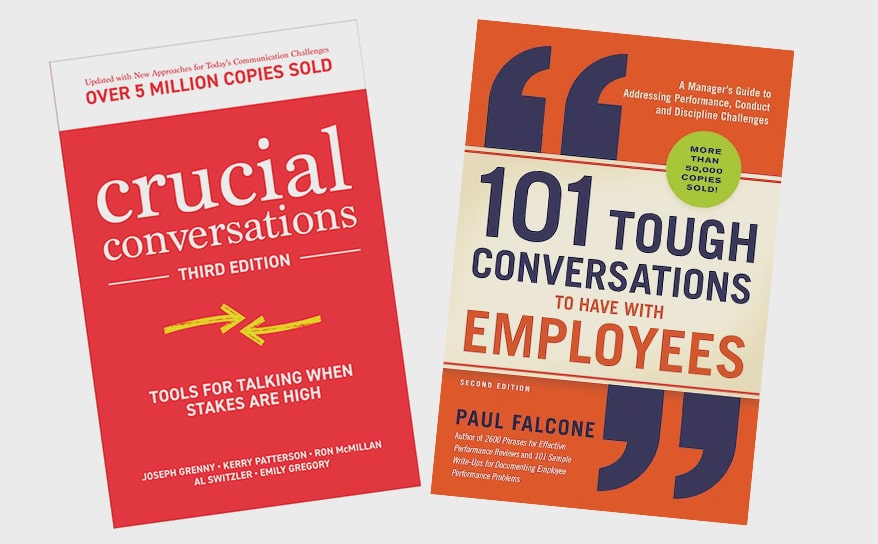ONE OF THE KEY strengths that leaders develop is the ability to address issues with “crucial conversations.” Learning to address your employees, vendors and customers about what they might feel are ‘hot topics’ is a critical skill! For some, these conversations come easy, but for most, it is something to practice and improve.
It’s often obvious when a crucial conversation is needed! For me, it’s when I have a stomachache or bad feeling when I think about a certain person or situation. Here are some of the typical situations that merit a crucial conversation:
- �Employee who is underperforming in any way
- �Customer who makes everyone miserable
- �Vendor who fails to deliver on time or is unresponsive
Having crucial conversations is about preparation, emotional control and practice. Here are some tips about each of these techniques.
Preparation
Getting ready for the conversation is helpful in building confidence and feeling less anxious. Take a few minutes to write out the issue clearly. Focus on behavior and impact rather than descriptions like “lazy” or “thoughtless” or “incompetent.” Behavior is something we choose; choices are about accountability. Adding the impact of the choice they are making helps the case for why you are addressing them.
Saying, for example, “You’re late most mornings because you’re a bad planner” is about a judgment. Instead, use, “By coming in late, you’re putting extra work on your fellow employees.”
Writing out your issues with the employee in the format of behavior and impact helps define the change you are looking for, and why.
Advertisement
Emotional Control
It’s normal to feel strong emotions when you are correcting behavior in others. If you are feeling very emotional, find someone you can confide in about the issues. Having heightened emotions can inhibit your ability to focus on the behavior at hand. Use a friend or mentor to get all your emotions out! Call them names, yell, say horrible things. Once you feel like you’ve off-loaded the emotion, you may be able to focus on the conversation ahead. If your actual conversation gets very emotional, do your best to stay centered. One technique I use is to lower my voice when
I’m upset in the conversation. It helps me stay calmer and forces the subject to be quieter to hear me.
Another technique is to bring in someone to attend the conversation whom you trust to help you convey the matter and stay calm. Use a buddy you trust!
Practice
By practice I mean both real-life practice, as well as role-play practice.
Once you’ve had several crucial conversations, you’ll be more comfortable and more willing to have them.
Role play can be very helpful, whether with someone else, or on your own in a mirror. Saying the right words, choosing your phrasing, and seeing your own body language can help you prepare and be ready. Don’t be shy about taking notes into the meeting to help you remember how you want to say things.
The joy of crucial conversations? I do experience real joy in being able to address issues and not feel powerless against bad situations. Learning to manage your business is more about managing people and expectations than managing widgets!
Advertisement
Learning to have conversations helps you be a great leader.
- Being direct and honest�
- Willing to trust others to learn and grow
- �Being open and listening in these conversations will make you more informed
- �Allowing others to know where they stand
- �Getting things fixed and on track
- �Learning to express your needs, not suppressing them
Make 2023 the year you embrace the joy of crucial conversations!
 There are some great books on this topic, as well!
Crucial Conversations by Joseph Grenny, 101 Tough Conversations to Have With Employees
by Paul Falcone
There are some great books on this topic, as well!
Crucial Conversations by Joseph Grenny, 101 Tough Conversations to Have With Employees
by Paul Falcone

 Tip Sheet1 week ago
Tip Sheet1 week ago
 Photo Gallery3 days ago
Photo Gallery3 days ago
 Ask Signs of the Times5 days ago
Ask Signs of the Times5 days ago
 Real Deal2 weeks ago
Real Deal2 weeks ago
 Benchmarks1 week ago
Benchmarks1 week ago
 Photo Gallery5 hours ago
Photo Gallery5 hours ago
 Women in Signs2 weeks ago
Women in Signs2 weeks ago
 Women in Signs1 week ago
Women in Signs1 week ago













